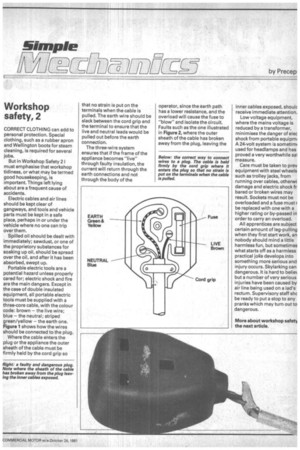Workshop safety, 2
Page 41

If you've noticed an error in this article please click here to report it so we can fix it.
CORRECT CLOTHING can add to personal protection. Special clothing, such as a rubber apron and Wellington boots for steam cleaning, is required for several jobs.
But in Workshop Safety 2 I must emphasise that workshop tidiness, or what may be termed good housekeeping, is important. Things left lying about are a frequent cause of accidents.
Electric cables and air lines should be kept clear of gangways, and tools and vehicle parts must be kept in a safe place, perhaps in or under the vehicle where no one can trip over them.
Spilled oil should be dealt with immediately; sawdust, or one of the proprietory substances for soaking up oil, should be spread over the oil, and after it has been absorbed, swept up.
Portable electric tools are a potential hazard unless properly cared for; electric shock and fire are the main dangers. Except in the case of double insulated equipment, all portable electric tools must be supplied with a three-core cable, with the colour code: brown — the live wire; blue — the neutral; striped green/yellow — the earth one. Figure 1 shows how the wires should be connected to the plug.
Where the cable enters the plug or the appliance the outer sheath of the cable must be firmly held by the cord grip so that no strain is put on the terminals when the cable is pulled. The earth wire should be slack between the cord grip and the terminal to ensure that the live and neutral leads would be pulled out before the earth connection.
The three-wire system ensures that if the frame of the appliance becomes "live" through faulty insulation, the current will return through the earth connections and not through the body of the operator, since the earth path has a lower resistance, and the overload will cause the fuse to "blow" and isolate the circuit. Faults such as the one illustrated in Figure 2, where the outer sheath of the cable has broken away from the plug, leaving the inner cables exposed, shoulc receive immediate attention.
Low voltage equipment, where the mains voltage is reduced by a transformer, minimises the danger of elec shock from portable equipmi A 24-volt system is someti MI used for headlamps and has proved a very worthwhile sal measure.
Care must be taken to prey equipment with steel wheels such as trolley jacks, from running over cables, otherwi damage and electric shock fr bared or broken wires may result. Sockets must not be overloaded and a fuse must r be replaced with one with a higher rating or by-passed in order to carry an overload.
All apprentices are subject certain amount of leg-pulling when they first start work, an nobody should mind a little harmless fun, but sometimes what starts off as a harmless practical joke develops into something more serious and injury occurs. Skylarking can dangerous. It is hard to belie but a number of very serious injuries have been caused by air line being used on a lad's rectum. Supervisory staff shc be ready to put a stop to any pranks which may turn out to dangerous.














































